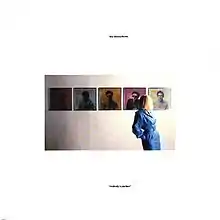Nobody's Perfect (The Distractions album)
Nobody's Perfect is the debut album by UK new wave band The Distractions. Following the records's poor sales, the band split in 1981,[1] the album remaining The Distractions' only LP.
| Nobody's Perfect | |
|---|---|
 | |
| Studio album by | |
| Released | 1980 |
| Genre | New wave, power pop, punk rock |
| Label | Island |
Quantick later used the song "Valerie" from the album on a BBC Radio 4 documentary called "The Disappearing Art Of The Mix Tape".[2]
Reception
| Review scores | |
|---|---|
| Source | Rating |
| Allmusic | |
| Smash Hits | 8/10[4] |
Writing for Smash Hits in 1980, David Hepworth described Nodbody's Perfect as an "enchanting and vaguely disturbing collection of vulnerable pop". Hepworth went on to say that the album could be "the most attractive and hardest wearing debut album since The Pretenders".[4]
In a 1987 "Rewind" article on the band written for the NME, David Quantick described the album as follows:
Nobody's Perfect was The Distractions' chance to expand on their nascent genius and by golly, they did...[they] pulled every pop stop out and made a quietly glorious record. It was modern, yet it harked back through pop history; it was melancholy and it was daft; all the good pop stuff.[5]
Track listing[6]
- "Waiting For Lorraine"
- "Something For The Weekend"
- "Boyscry"
- "Sick and Tired"
- "Leave You To Dream"
- "Louise"
- "Paracetamol Paralysis"
- "(Stuck In A) Fantasy"
- "Nothing"
- "Wonder Girl"
- "Still It Doesn't Ring"
- "Untitled"
- "Looking For A Ghost"
- "Valerie"
References
- "Rarebird's Spotlight Album Review #8: Distractions - Nobody's Perfect". Rarebird. Retrieved 24 July 2009.
- "BBC - Radio 4 - Factual - The Disappearing Art Of The Mix Tape". BBC. Retrieved 9 April 2009.
- Allmusic review
- Hepworth, David. "Albums". Smash Hits (May 29 – June 11, 1980): 30.
- "Almost Perfect" from the New Musical Express, David Quantick (12 December 1987)
- "allmusic ((( Nobody's Perfect - Overview )))". allmusic. Retrieved 24 July 2009.